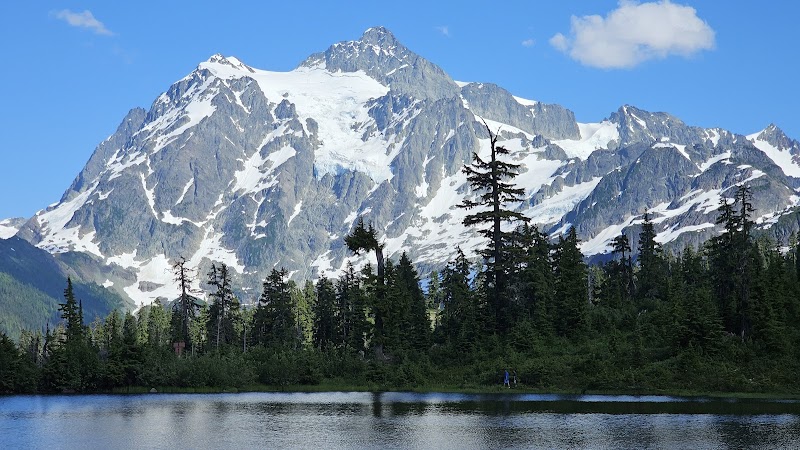
Mount Baker Wilderness Adventures
Mount Baker Wilderness offers outdoor enthusiasts a pristine landscape with panoramic views, challenging trails, and diverse ecosystems nestled in the North Cascades of Washington.
Popular Activities
Conquer the Wild Majesty of Mount Baker Wilderness: A Hiker's Guide to Adventure
In the heart of Washington State, where the mountains rise proudly against the sky, the Mount Baker Wilderness sprawls like a grand invitation for adventurers. This sprawling expanse, known for its stunning glacial peaks and vibrant alpine meadows, beckons hikers to embark on journeys that challenge both body and spirit. Imagine standing among towering Douglas firs, their fragrant boughs swaying gently in the crisp mountain breeze, as you prepare to take on the breathtaking trails of this stunning wilderness.
The Mount Baker Wilderness features a network of well-maintained trails that lead you through some of the most impressive landscapes in the Pacific Northwest. Whether you’re a seasoned hiker or just beginning to explore the great outdoors, the region offers a variety of options suitable for all levels. One popular entry point is the Heather Meadows area, which possesses a striking blend of volcanic rock and flourishing wildflowers. Here, novice adventurers can opt for less strenuous paths, while more experienced hikers will be tempted by the rugged shoreline of Baker Lake, steep ascents, and rocky scrambles.
Before setting off on your adventure, it’s essential to arm yourself with knowledge about elevation, weather conditions, and trail specifics. A typical day hike can involve gains of up to 1,500 feet, leading to panoramic vistas that reveal the true grandeur of the Cascades. Ensure you arrive early in the day—mornings in this wilderness can be electrifying, with the sun illuminating the mountain peaks in hues of gold and orange.
As you lace up your hiking boots and secure your backpack, consider your hydration plans. The Mount Baker Wilderness is rich with clean, cold streams that entice tired hikers to pause and take a refreshing sip, but it’s wise to carry an adequate supply of water, especially on warmer days. Adjustable trekking poles can offer much-needed stability on rocky or uneven terrain, granting you the confidence to navigate steep descents and climbing scrambles with ease.
With every step, the sensory experiences abound. The crunch of gravel underfoot draws your attention, while the whisper of the wind speaks secrets of the land’s history. Keep your eyes peeled for the playful antics of mountain goats as they navigate craggy cliffs; their presence is a reminder of the wild heart of the region. The landscape shifts dramatically, from dense forest to alpine meadows bursting with color during the summer months, presenting a sensory feast that invites you to explore deeper.
The most rewarding views lie just beyond the hardest hikes. Most trails lead to breathtaking overlooks where the majesty of Mount Baker looms large, its glaciers glistening in the distance, whispering tales from long ago. As the sun sets, these high vantage points offer an unparalleled spectacle, with changing colors washing over the landscape like a painter’s brush.
Bear in mind the importance of Leave No Trace principles, as the wilderness thrives on the respect we show for its delicacy. Stay on established trails, pack out what you pack in, and observe wildlife from a respectful distance to ensure future visitors can appreciate the same breathtaking environments.
Epic sunsets are not the only treasures hidden in this wilderness; well-stocked campgrounds are available for those looking to extend their adventure into the night. Imagine sitting by a crackling campfire under a blanket of stars, the rustling trees swaying gently as if sharing stories with lingering echoes of your day’s journey.
The Mount Baker Wilderness is not merely a destination; it’s an invitation to push your limits, to find peace in nature’s beauty, and to reconnect with the wild spirit that resides within you. Prepare yourself, gather your gear, and let the spirit of adventure lead the way—you are about to embark on an unforgettable journey in the embrace of Mount Baker’s breathtaking wilderness.
Plan Your Visit
Everything you need to know to prepare for an unforgettable trip to Mount Baker Wilderness.
Entrance Requirements
Free access, but some areas require self-issued wilderness permits.
Best Time to Visit
Best visited late June through September for optimal trail conditions.
Visitor Information
Glacier Public Service Center offers information and permits.
Getting There
Reachable via Highway 542 with some trailhead roads requiring high-clearance vehicles.
Weather & Climate
The area experiences a maritime climate with significant snowfall in winter. Summers are generally mild to warm, with temperatures ranging from 40°F to 70°F. Frequent rain can occur, so rain gear is essential.
Conservation Efforts
Threats include climate change impacts, such as glacial melting, and fire risks during dry seasons. Conservation efforts focus on maintaining trail systems and protecting native species.
Camping in Mount Baker Wilderness
Find the perfect spot to stay overnight and immerse yourself in the details.
Baker Lake Campground
Located near Baker Lake, offering easy access to trails and water activities.
Douglas Fir Campground
Offers a rustic camping experience close to the wilderness boundary.
Top Trails
Hannegan Pass Trail
Features beautiful wildflowers and access to further alpine trekking.
Lake Ann Trail
Leads to a picturesque alpine lake with views of Mount Shuksan.
Skyline Divide Trail
Offers spectacular ridge walking with panoramic views.
Chain Lakes Loop
Loops through stunning alpine scenery with reflective lakes and mountain views.
Trailblazer Tips
Start hikes early to avoid afternoon cloud cover on summits.
Be prepared for snow-covered trails in higher elevations until mid-summer.
Certain areas require self-issued wilderness permits; pick one up at trailheads.
Bring microspikes or snowshoes for early spring visits due to lingering snow.
